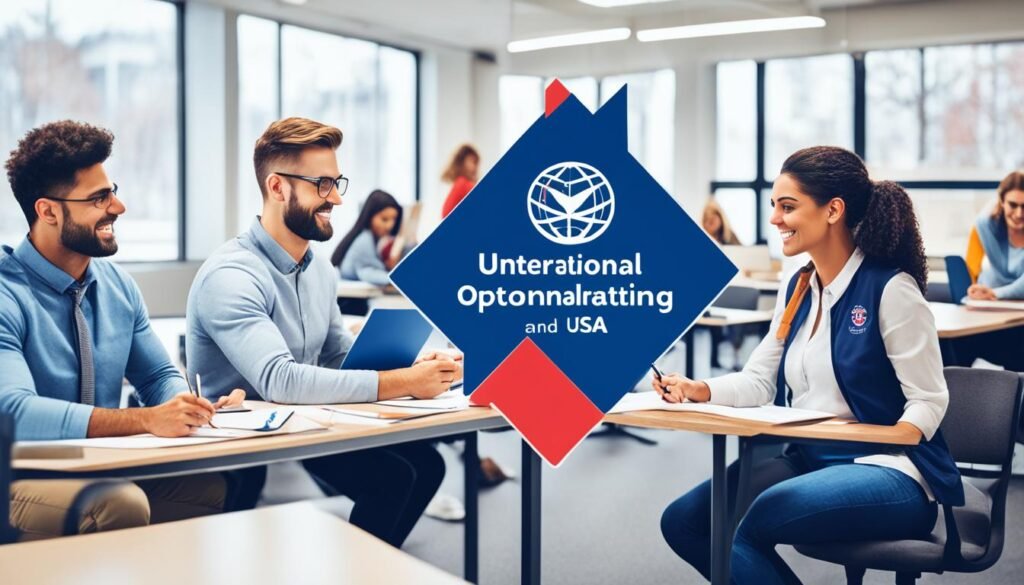Did you know that international students studying in the USA have certain limitations on the number of hours they can work while pursuing their education? The work limits for international students vary depending on their visa status and the institution they are enrolled in. This information is crucial for international students who want to make the most of their time abroad and explore employment opportunities.
Whether you are a current international student or planning to study abroad, it is essential to understand the regulations surrounding work limits for international students in the USA. By knowing your rights and limitations, you can make informed decisions about your employment options and ensure compliance with the law.
Visa Restrictions and Work Limits
When it comes to working in the USA as an international student, it’s important to understand the visa restrictions and work limits that apply to you. These regulations are determined by your visa status, and it’s essential to comply with them to avoid any legal issues. Let’s explore the work limits for international students in the USA.
International students on an F-1 visa, which is the most common visa type for academic studies, have certain work privileges. During the school year, F-1 visa holders are generally allowed to work on-campus for up to 20 hours per week. This allows students to gain practical experience and earn money to support their studies. However, during school breaks, F-1 students can work full-time without any restrictions.
However, it’s important to note that off-campus employment as an F-1 student is subject to additional restrictions. Before engaging in any off-campus work, international students must obtain authorization from the United States Citizenship and Immigration Services (USCIS). This ensures that the employment is legal and in compliance with the visa regulations.
On the other hand, international students on an M-1 visa, which is for vocational or non-academic studies, have more limited employment options. M-1 visa holders are generally only allowed to work during their program of study, making it crucial to plan and utilize their employment opportunities strategically.
Understanding the visa restrictions and work limits is essential for international students in the USA. By adhering to these regulations, you can make the most of your educational experience while staying compliant with the law.

Optional Practical Training (OPT)
International students studying in the USA have the opportunity to gain valuable work experience in their field of study through the Optional Practical Training (OPT) program. OPT allows students to apply their academic knowledge in a professional setting, enhancing their skills and increasing their employment prospects.
Under OPT, international students are eligible to work for up to 12 months, either during or after completing their studies. This program provides students with a valuable opportunity to gain practical experience and explore the US workforce.
STEM (Science, Technology, Engineering, and Mathematics) degree holders may be eligible for an extension of their OPT period for an additional 24 months. This extension allows students with qualifying degrees to further enhance their skills and gain deeper industry experience.
Participating in OPT not only provides international students with work experience, but also allows them to expand their professional network, develop transferable skills, and potentially secure future employment opportunities in the USA or their home countries.
To participate in OPT, international students must apply for employment authorization through the United States Citizenship and Immigration Services (USCIS). It is important for students to carefully follow the application process and adhere to the regulations to ensure they can make the most of this valuable opportunity.

Overall, the Optional Practical Training (OPT) program provides international students with a valuable opportunity to gain work experience in their field of study, enhancing their skills and increasing their employment prospects. By participating in OPT, students can apply their academic knowledge in a professional setting and develop the practical skills necessary for success in their chosen careers.
Curricular Practical Training (CPT)
Curricular Practical Training (CPT) is an excellent opportunity for international students studying in the USA to engage in paid employment that aligns with their academic curriculum. This program allows students to gain valuable work experience, develop professional skills, and enhance their career prospects.
Under CPT, international students can participate in internships or cooperative education programs that provide hands-on training and practical experience related to their field of study. This type of paid employment serves as an integral part of their curriculum, allowing them to apply the concepts and theories learned in the classroom to real-world situations.
The specific work limits for CPT are determined by the academic institution and the requirements of the program. International students should consult with their designated school official (DSO) to understand the regulations and obtain authorization before engaging in any CPT activities.
CPT offers international students the opportunity to earn income while gaining valuable work experience in their chosen field. It not only provides financial support but also enhances their skillset and marketability in the competitive job market.

Work-Study Programs
Many universities in the USA offer work-study programs designed to assist international students in financing their education. These programs provide opportunities for students to work on-campus or with select off-campus employers while earning money to cover their expenses. Work-study programs can be a valuable source of financial aid for international students, allowing them to gain work experience and alleviate some of the financial burden associated with studying abroad.
International students participating in work-study programs are typically subject to work limits similar to those imposed on on-campus employment. These limits usually allow students to work up to 20 hours per week during the academic year. However, it is important to note that work limits may vary depending on the specific university and the student’s visa status.
Students interested in work-study opportunities should reach out to their university’s financial aid office to learn more about the available options and eligibility requirements. Financial aid advisors can provide guidance on how to apply for work-study positions, help students navigate the application process, and ensure they meet the necessary criteria.

Financial Aid and Work Experience
In addition to providing financial support, work-study programs offer international students the chance to gain valuable work experience and develop important skills within their field of study. This hands-on experience can enhance their resumes and make them more competitive in the job market upon graduation.
Moreover, work-study programs often offer the opportunity to work closely with faculty members, allowing students to establish professional connections and broaden their professional network. Students may also have the chance to participate in research projects or gain exposure to industry-specific knowledge and practices.
Overall, work-study programs serve as a valuable resource for international students, providing both financial aid and professional development opportunities. By leveraging these programs, students can not only alleviate the financial burden of studying abroad but also enhance their educational experience and increase their career prospects.
Social Security Number and Taxes
International students who are authorized to work in the USA will need a Social Security Number (SSN) to legally report their income and pay taxes. The SSN is a unique identification number issued by the Social Security Administration and is used to track individuals’ earnings and contributions to the social security system.
To apply for an SSN, international students should visit their nearest Social Security Administration office and present the necessary documentation, including a valid work authorization document, such as an Employment Authorization Document (EAD), and a letter from their employer confirming their job offer. The process may require filling out an application form and providing proof of identity, such as a passport and I-94 Arrival/Departure Record.
Once an international student obtains an SSN, they can use it to report their income to the Internal Revenue Service (IRS) when filing their annual tax return. It is important for international students to understand their tax obligations and fulfill them in a timely manner. Failure to report income and pay taxes can result in penalties and legal consequences.
International students who are unsure about their tax obligations or need assistance with tax-related matters should consider consulting with a tax professional or utilizing resources provided by their educational institution, such as workshops or guidance from international student services.
Being knowledgeable about tax responsibilities will help international students stay in compliance with US tax laws and ensure a smooth and legal work experience during their time in the USA.
Conclusion
For international students studying in the USA, the opportunity to work and gain valuable experience is a significant aspect of their educational journey. However, it is crucial for these students to understand the work limits and visa restrictions that apply to them. By familiarizing themselves with the regulations and following the necessary steps to obtain work authorization, international students can make the most of their time in the USA and enhance their educational and career prospects.
Studying abroad can present excellent employment opportunities for international students. Whether through on-campus positions, Optional Practical Training (OPT), Curricular Practical Training (CPT), or work-study programs, students can acquire practical skills and gain exposure to their chosen fields. These experiences not only enrich their academic knowledge but also provide valuable networking opportunities that may prove beneficial in their future careers.
However, it is also essential for international students to be mindful of the limitations imposed on their employment options. Visa status plays a significant role in determining the number of hours an international student can work, both on and off-campus. Understanding these work limits and complying with the regulations is crucial to avoid any potential consequences that may jeopardize their stay in the country.
In summary, while studying in the USA offers incredible employment possibilities for international students, it is vital for them to navigate the work limits and visa restrictions wisely. By doing so, international students can make the most of their studying abroad experience, broaden their skill sets, and enhance their future career prospects.
Source Links
- https://leverageedu.com/learn/study-in-grenada-scholarships-programs-for-international-students-in-st-georges-university-sgu-school-of-medicine-news-2024-02/
- https://leverageedu.com/learn/study-abroad-3-licences-that-will-help-to-earn-more-in-2024-in-canada-news-2024-02/
- https://asia.nikkei.com/Politics/International-relations/Japan-Italy-PMs-to-work-for-success-of-G7-summit

